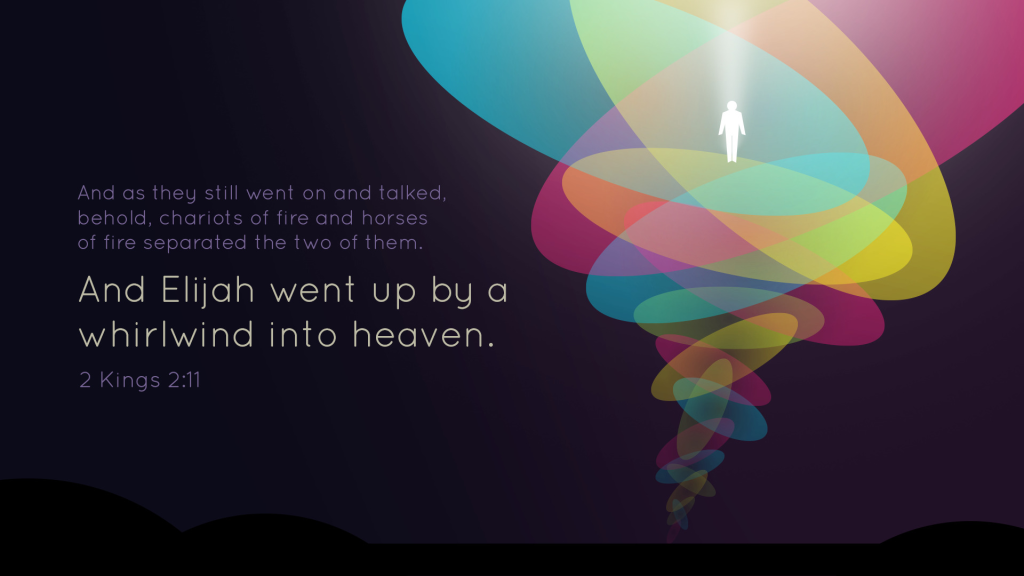
11 Isaiah (Isa 66:15–16) utilizes the figure of fire and chariots like a whirlwind to depict God’s coming in judicial anger against sinful humanity. Much of that imagery was probably drawn from texts portraying God as present in intense thunderstorms (e.g., Pss 18:9–15; 29:3–9).[1]
11. Instead of unprofitable and improper enquiries concerning this event, I would rather refer the Reader to the consideration, how lively a type the prophet was, in this instance, of his divine master. And is it not probable (for I beg it may be understood that I do not presume to say as much) that from this view of the prophet, in his translation, like Enoch, to glory, the minds of the faithful in the church through all the intermediate ages from Elijah to Christ, were strengthened in their faith of the coming Saviour; the outlines of whose redemption-work they were brought savingly acquainted with? Heb. 11:5.[2]
Ver. 11.—And it came to pass, as they still went on, and talked (comp. Luke 24:50, 51). The antitype answers to the type in little details as well as in the general outline. That behold, there appeared a chariot of fire, and horses of fire. God’s “angels are spirits, and his ministers a flaming fire” (Ps. 104:4). When the eyes of Elisha’s servant were opened, and he saw the angelic host that protected his master, it appeared to him that “the mountain was full of horses and chariots of fire round about Elisha” (ch. 6:17). Material fire is, of course, not to be thought of. But the glory and brightness of celestial beings, when made visible to man, has some analogy with fire, or at any rate brings the conception of fire before the mind. The historian doubtless reports the account which Elisha gave of what he saw on this memorable occasion. And parted them both asunder; and Elijah went up by a whirlwind into heaven; literally, and Elijah went up in a storm into the heavens. There is no mention of a “whirlwind;” and “the heavens” are primarily the visible firmament or sky which overhangs the earth. Elijah, like our Lord, rose bodily from the earth into the upper region of the air, and was there lost to sight. Three only of the seed of Adam—Enoch, Elijah, Jesus—have passed from earth to heaven without dying.[3]
2:11 In one of the most dramatic scenes in the Bible, heaven opened, a fiery chariot with fiery horses appeared, a whirlwind blew, and the prophet of God vanished alive into heaven. The fire associated with the chariot and the horses indicate the presence of God, much as the fiery angels do that Isaiah saw stationed around the throne of God (Is. 6:2).[4]
2:11 chariot of fire and horses of fire. The horse-drawn chariot was the fastest means of transport and the mightiest means of warfare in that day. Thus, the chariot and horses symbolized God’s powerful protection, which was the true safety of Israel (v. 12). As earthly kingdoms are dependent for their defense on such military force as represented by horses and chariots, one single prophet had done more by God’s power to preserve his nation than all their military preparations.[5]
[1] Patterson, R. D., & Austel, H. J. (2009). 1, 2 Kings. In T. Longman III & D. E. Garland (Eds.), The Expositor’s Bible Commentary: 1 Samuel–2 Kings (Revised Edition) (Vol. 3, p. 814). Zondervan.
[2] Hawker, R. (2013). Poor Man’s Old Testament Commentary: 1 Kings–Esther (Vol. 3, p. 162). Logos Bible Software.
[3] Spence-Jones, H. D. M., ed. (1909). 2 Kings (p. 21). Funk & Wagnalls Company.
[4] Radmacher, E. D., Allen, R. B., & House, H. W. (1999). Nelson’s new illustrated Bible commentary (pp. 463–464). T. Nelson Publishers.
[5] MacArthur, J. F., Jr. (2006). The MacArthur study Bible: New American Standard Bible. (2 Ki 2:11). Thomas Nelson Publishers.
